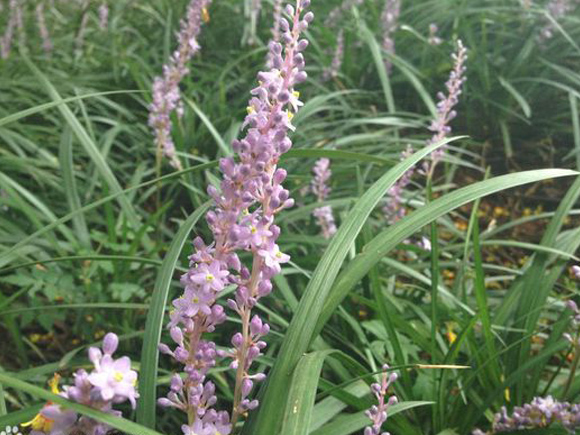Monkey grass is also known as mondo grass and ophiopogon japonicus in Latin name. It is called Mai Men Dong in mandarin, literally translated, means "wheat winter" because of its wheat-like root hair and evergreen leaves in winter. Medicinally it has long been used as a yin tonic. But the medicinal part of this Chinese herb is not the leaf but the root, which looks like a plump and cute spindle. One of its magnum opuses is the ophiopogon combination (Mai Men Dong Tang). This herbal recipe is widely used for the treatment of Chronic Bronchitis, Bronchiectasis, chronic pharyngolaryngitis, silicosis, Tuberculosis, gastric and duodenal ulcers, chronic atrophic gastritis, morning sickness, etc.
MONKEY GRASS HEALTH BENEFITS
This herb was first recorded in the "Shen Nong's Herbal Classic", the oldest and well-kept ancient pharmacology book found in China by far. Also known as "the elixir", it has long been regarded as one of top-grade tonics. Monkey grass roots contain a variety of steroidal saponins, carotenoids, mucilage, sugars, stigmasterol, and other ingredients. Pharmacological experiments show that it can increase white blood cell counts, extend the lifespan of antibodies, improve immune function and DNA synthesis rate, and promote the production of antibody, complement, interferon, lysozyme, and other immune substances.

Monkey Grass
OPHIOPOGON JAPONICUS HERBAL REMEDIES
Chinese Pharmacopoeia informs that it is sweet and slightly bitter in flavor and slightly cold in nature. It goes to meridians of heart, lung, and stomach. Major functions include enriching Yin to promote the secretion of saliva or body fluid, moistening lung, and clearing away the heart-fire. Main monkey grass uses and indications are dry cough due to lung dryness, consumptive cough, thirst caused by body fluid deficiency, irritability, insomnia, diabetes, intestinal dryness with constipation, and pharyngeal diphtheria. Recommended dosage is from 6 to 12 grams.
1. Mai Men Dong Tang from Jin Gui Yao Lue (Essential Prescriptions of the Golden Cabinet). This formula is used to treat reversed flow of qi and vomiting due to stomach yin deficiency. And other ingredients are Ban Xia (Pinellia), Ren Shen (Ginseng), etc.
2. Zeng Ye Tang from Wen Bing Tiao Bian (Detailed Analysis of Warm Diseases). It is combined with Sheng Di Huang (Rehmannia) and Xuan Shen (Scrophularia) for the treatment of constipation caused by deficiency of body fluid, which is consumed by pathogenic fire-heat.
3. Qing Zao Jiu Fei Tang from Yi Men Fa Lu (Precepts for Physicians). It is formulated with E Jiao (Colla Corii Asini), Shi Gao (Gypsum), Sang Ye (White Mulberry Leaf), Pi Pa Ye (Loquat Leaf), etc. to treat dry nose and throat, dry cough with less phlegm, coughing up blood, sore throat and hoarseness.
4. Qing Ying Tang from Wen Bing Tiao Bian. It is mixed with Huang Lian (Coptis Root), Rehmannia, scrophularia, etc. to cure exuberant heat in heart-nutrient phase, annoyance, and insomnia.

![Diseases, Symptoms, tcm, [tcmwindow.com]](/uploadFile/adImg/2015/11/11/f5cbfcc0-4df5-4646-9b9a-f316651a0199.jpg)





